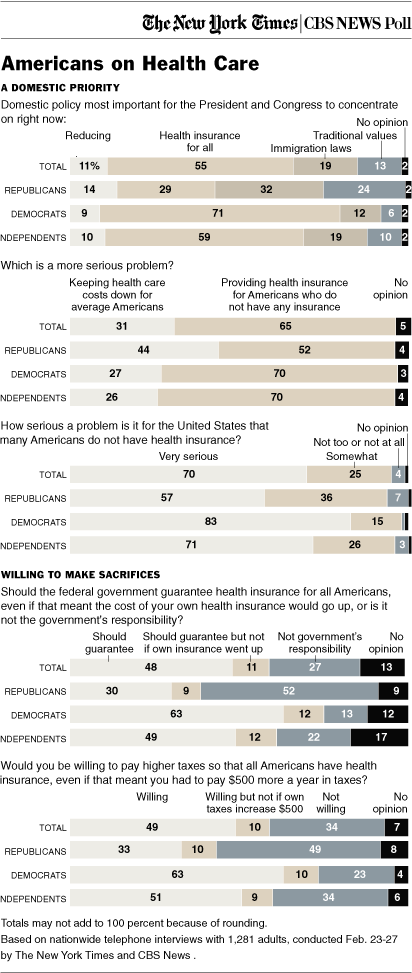Is it even possible to aptly compare the US to other countries with socialized medicine. We have 10 times the amount of people Canada has, and no country with our resources even comes close to the immigration issues we face. I think some level of basic healthcare for children, regardless of immigration status, should be in place above what exists now, but comparisons to other countries are really limited.
Well, ok. If you hate working with large systems, then break it down by state. Start with Wyoming, population 506529 (2004), and work your way up.
http://wyominguninsured.state.wy.us/
"A comprehensive Wyoming study of the uninsured in Wyoming indicates that
one in seven Wyoming citizens are uninsured and many of these citizens need help to obtain coverage. The cost of health insurance and the cost of health care coupled with low wages is seen as the major cause for folks being uninsured. The consequences to the individual, the family, the health care provider, and the community are high. Developing options to spend health care dollars proactively to expand health insurance to the uninsured will result in care being provided early when it is least expensive and most effective.
http://wyominguninsured.state.wy.us/WaiverStudy1.21.05.pdf
"The increasing lack of health care coverage
continues to affect access to care and place
financial stress on individuals, families and healthcare providers. Nationwide, the number
of nonelderly uninsured increased from 16.1 percent to 17.7 percent between 2000 and 2003.1
In Wyoming, the number of nonelderly uninsured has increased from 18.1 percent to 19.2
percent since 2000.2
The increase in the uninsured has been driven by the decline in employer-sponsored
insurance and the increase in the number of individuals below the poverty level.3 While
children s coverage has not declined nationwide over the same time period due to increases
in public healthcare coverage programs such as Medicaid and the State Children s Health
Insurance Program (SCHIP), this has not been the case for adult populations.4 The working
poor between the ages of 19 and 64 have the least number of options to obtain coverage as
they may earn too much to qualify for public health insurance programs and may not have
access to (or be able to afford) employer-based coverage.
********
Here is a story with a more national focus from the Wall Street Journal (reposted). It show how our current system results in extreme waste of $20 billion dollars to do nothing but deny claims as aggressively as possible on the one side and challenge denials on the other (each side spends about $10 billion apiece) -- great use of our healtcare insurance premiums -- we are paying for this junk. This of course the tip of the iceberg as hundreds of billions of dollars are wasted on administration that does nothing to provide more or better healthcare care.
http://www.pnhp.org/news/2007/february/excess_administratio.php
Fights Over Health Claims Spawn a New Arms Race
By Vanessa Fuhrmans
The Wall Street Journal
February 14, 2007
Doctors increasingly complain that the insurance industry uses complex, opaque claims systems to confound their efforts to get paid fairly for their work. Insurers say their systems are designed to counter unnecessary charges and help keep down soaring health-care costs. Like many tug-of-wars over the health-care money pot, the tension has spawned a booming industry of intermediaries.
It's called "denial management." Doctors, clinics and hospitals are investing in software systems costing them each hundreds of thousands of dollars to help them navigate insurers' systems and head off denials. They're also hiring legions of firms that dig through past claims in search of shortchanged payments and tussle with insurers over rejected charges. "Turn denials into dollars," promises one consultant's online advertisement.
The imbroglio is costing medical providers and insurers around $20 billion — about $10 billion for each side — in unnecessary administrative expenses, according to a 2004 report by the Center for Information Technology Leadership, a nonprofit health-technology research group based in Boston.
Some companies are profiting from arming both sides. Ingenix, a unit of UnitedHealth Group Inc., the country's second-biggest health insurer, sells insurers systems to screen doctor's claims while promising doctors its software for them will "help you take a more assertive stance on fair and accurate payment."
The denial-management industry's rise shows how much of medical spending is consumed by propping up and doing battle over an arcane patchwork of claims systems.
Roughly 30% of physicians' claims are denied the first time around. Sales of physician-billing and practice-
management technology grew 25% to more than $7.5 billion last year, estimates Jewson Enterprises, a health information-technology research firm in Austin, Texas.
Some doctors say they see insurers stepping up efforts to keep a lid on reimbursements. One increasingly popular tactic among health insurers is to hire "health-care claims recovery" teams or software to dig through claims, some as old as two years, to see if they overpaid and seek redress. That's partly because more states have been adopting "prompt pay" laws that require health insurers to reimburse claims within 30 or 60 days, says UnitedHealth spokesman Tyler Mason, which sometimes doesn't leave enough time to review them first. "We need to have a way to still thoroughly review whether a claim's paid correctly or not," Mr. Mason says. Some insurers demand the money back. More, though, simply deduct it from future claim payments. That forces doctors to appeal the claim all over again.
http://online.wsj.com/article/SB117141549626107896.html

